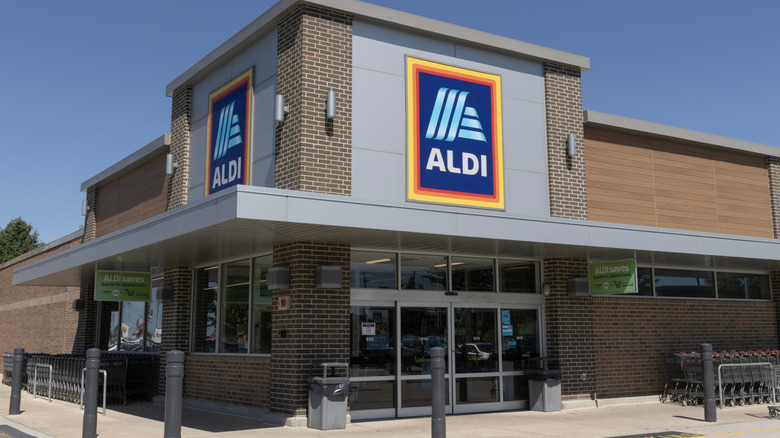Why Aldi's Meat Is So Affordable
Most Americans will know Aldi as their friendly neighborhood grocery store. Smaller and more intimate than the bigger chains, it's become synonymous with everyday low prices, great deals, and good quality. And that includes the meat, which is often notably cheaper than its peers.
Conspiracy theorists may narrow their eyes at this, saying that the meat must be of poorer quality or past its sell-by or best-by dates. While there are certain meats to keep a particular eye out for at Aldi's and others to avoid, like any grocery store meats, there are legit reasons why their meat is so affordable. The chain follows a smart business approach that includes streamlining its staff contingency, creating efficiencies in different areas across all the stores, and stocking more private-label products than big commercial brands on its shelves. In fact, 90% of Aldi's brands are private label, and you'll find that the few name brand items that Aldi carries are discontinued products (so the last-of) or overstock that they get hold of at better prices.
Probably the most significant contributor to the more affordable prices, though, is that Aldi works with local businesses, sourcing meat from local producers. These are often smaller businesses that offer high-quality meat. And because they're within the same region, they're within closer proximity to the Aldi stores than bigger branded producers. So consumers are getting excellent quality without having high transport costs factored into the product prices.
Ald's small but effective tricks keep meat prices low
Aldi also sells its local meats under its own name, which saves itself (and the customer) from paying for both the meat and the "privilege" of carrying branded meats. Carrying well-known brands comes with its own price tag, which is ultimately passed on to the consumer.
Then we have the staff efficiency. Aldi has far fewer staff members in all of its stores — where a bigger chain would have dedicated staff for areas like stocking the shelves, cleaning, working the tills, and packing the customer's bags, Aldi has six to eight employees running the whole store. These multitasking teams allow the wage bill to be much lower, with these savings being passed on to the consumer. This is okay because Aldi stores are physically smaller in size than their bigger peers. It's not a bad deal for the employees either, because they get to expand their skill sets in more areas than more direct-tasked individuals would be able to.
Aldi is also very smart when it comes to saving a buck across other areas, which benefits the customer in the end. These include having minimal decorations in-store, using an energy-efficient store design, and encouraging customers to bring their own bags. The stores are also open for fewer hours than bigger chains, saving on operational and wage costs. And let's not forget the shopping-cart rental system, which requires a quarter to be inserted to release the cart, which is then returned to the shopper when the cart is brought back. So the stores don't need staff to gather and return carts.

